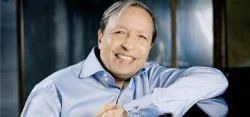|
Symphony
FROM THE NEW WORLD TO THE OLD WORLD
by Peter Lert
Saturday, June 14, 2025
Chamber
MC2 DUO RECITAL CLOSES 222'S SEASON
by Terry McNeill
Saturday, June 14, 2025
Choral and Vocal
CANTIAMO SONOMA'S LUSCIOUS A CAPELLA SINGING IN SEASON ENDING CONCERT
by Pamela Hicks Gailey
Sunday, June 8, 2025
Symphony
SRS SEASON ENDS WITH RESOUNDING TA-TA-TA-BANG
by Terry McNeill
Sunday, June 1, 2025
Symphony
YOUTHFUL VIRTUOSITY ON DISPLAY AT USO'S MAY CONCERTS
by Peter Lert
Saturday, May 17, 2025
Symphony
MYSTICAL PLANETS AND LIVELY GERSHWIN ORTIZ AT FINAL SRS CONCERT
by Peter Lert
Sunday, May 4, 2025
Symphony
VSO'S CONCERT MUSIC OF TIME, MUSIC OF PLACE
by Peter Lert
Sunday, April 27, 2025
VOCAL ELEGANCE AND FIRE AT THE 222'S RECITAL APRIL 26
by Pamela Hicks Gailey
Saturday, April 26, 2025
CANTIAMO SONOMA SINGS AN INSPIRED GOOD FRIDAY MOZART REQUIEM CONCERT
by Pamela Hicks Gailey
Friday, April 18, 2025
DRAMATIC SHOSTAKOVICH SYMPHONY CLOSES PHILHARMONIC'S 25TH SEASON
by Terry McNeill
Sunday, April 13, 2025
|
 |
 Pianist Murray Perahia |
PERAHIA'S INTENSITY SHINES IN WEILL HALL RECITAL
by Terry McNeill
Saturday, March 7, 2015
Murray Perahia has built a long pianistic career based on performances of discernment, classical structure and impeccable taste. His playing always exudes a refinement and lapidary attention to musical detail. And so it was in his March 7 Weill Hall debut recital before an audience of 900, with a conventional program of balanced and celebrated works.
Opening the evening Bach’s 6th French Suite (BWV. 817) received a reading emphasizing careful dynamic control, fast tempos in the Courante and Bourrée, intriguing embellishments and much half pedal. In Weill piano concerts with a less-than-full house, fast tempos, diminished volume and legato playing can pose clarity difficulties. And Mr. Perahia’s Bach and the Beethoven “Les Adieux” Sonata that closed the first half, especially in Le Retour, displayed a lack of textural clarity in the fleet sections with large resonance.
This is not to say that the pianist played the Op. 81a Sonata routinely, a piece he has lived with for decades. The Andante Espressivo L’Absence had the requisite sprightly tempo, lovely tone colors and patrician phrasing, and surprisingly in the finale there were doubled left-hand bass chords and brusque sforzandos. The music always had intensity and prismatic tints that shone resplendidly.
New York Times critic Harold Schonberg described Mr. Perahia’s pianism, after honoring the note-perfect mastery and serious musicianship, as in many big works “overly polite.” If that observation was accurate, and I think it was, things have certainly changed, as in Franck’s Prelude, Choral and Finale that opened the second half. In each of the program’s works, save for Haydn’s fleet A-Flat Major Sonata, smudged notes popped up but never affected the music’s impetus or in the Franck the course of the big single melodic idea. The playing captured the piece’s Romantic mystical nature and the Bach references in the Fugue. There were unexpected inner voices and just a little ferocity in the Choral, the focal point of the 1884 piece, a specialty of the late Jorge Bolet.
Chopin’s B Minor Scherzo ended the program. Here Mr. Perahia used big dynamic contrasts to give variety to the many repeats (I have always thought the cut version more effective) and though he eschewed big sonority he seized the Scherzo’s restless momentum and histrionics. The fiery coda went off the tracks in the final tumultuous upward run but the audience rightly loved it and responded with a prolonged standing ovation.
Chopin’s F Major Nocturne from Op. 15 was the first encore, and the playing was curiously lacking in subtle rubatos and had monochromatic tone color. The tranquil cantilena and strong left hand in the turbulent middle section were admirable. Speed returned to buffet clarity in the last encore, Schumann’s Traumes Wirren from the Op. 12 Fantasiestücke. Since these “dreams” are skittish, finger velocity is a necessity, and Mr. Perahia provided it but without transparent control at the highest level of technique.
The pianist’s connection with Weill’s audience was formal and unassuming (minimal bows, austere facial expression) that in some ways reflected his cultivated and assured artistry.
|
